Embrace the suck…
Among endurance athletes, this phrase is as common as “good morning” or “I’m hungry”. We push ourselves every day, with the goal of being better than yesterday. So, inevitably, we have to do long, hard, uncomfortable training sessions. That’s how we grow and in those moments, it sucks. So, rather than view it as a burden, we embrace it because it is the only way to get where we want to be.
Internalizing that mentality has served me outside of triathlon training. Recently, I was diagnosed with prostate cancer. The diagnosis came as a “whack-a-mole” kind of gut punch. I was aware that men of African descent have increased risks for developing the disease. However, I incorrectly assumed that it was the disease of older men (65 yrs or more).
Fortunately, there are several approaches to managing prostate cancer. Choosing one depends on various factors; one’s age, physical condition, the extent of cancer, and whether or not it’s contained to the prostate are a few. During my initial diagnosis and discussion, I didn’t really hear what the urologist said after “you have prostate cancer”. I know that he briefly went through the different treatment approaches and their side effects then suggested surgery as my best option. However, he thought that I needed to talk with a urologic surgeon and discuss the options in more detail.
Typically, these are slow-growing tumors, so I had time to sit and absorb what was happening before making any decisions. Looking back, what stands out the most from the blurred conversation with my urologist is that he believed I am the youngest man he’d ever diagnosed with the disease. Frankly, I’m not a fan of that kind of luck.
The reality of things – the suck
After having detailed discussions with two local surgeons and one in Baltimore, MD, I began to more fully understand that I was about to hit a turn in the road of life. One which would change me in unexpected ways. Having an analytical mind allowed me to quickly determine that removal of the gland (radical prostatectomy) was the best choice. Although the surgeons made it clear that there was no rush, I didn’t see the point in waiting. Nothing would change by waiting. In addition, I would have background stress until I had the procedure. The catch….surgical removal has two guaranteed side-effects; Incontinence and erectile dysfunction. —- 😱 Oh SHIT FUUUUCKK!!! The Horror!!!
Time to Embrace the Suck.
First, I acknowledge that I have a whole bunch of personal work to do to address my initial reaction to (hopefully temporary) erectile dysfunction and incontinence. I’m aware that it shouldn’t affect my self-perception as a man. Yet, it does….profoundly. Without those functions intact, my sense of manhood is greatly diminished. It’s nonsensical, I know. However, unfortunately, I have bought into the pervasive cultural narrative that the quality of a man is inextricably linked to the potency and size of his dick. His magnitude of machismo as a gauge of his standing on the manhood scale. Most of these beliefs are more insidious and they permeate much of my thinking and self-image. In a way, dealing with this type of cancer has gifted me a new type of mirror. One that forces me to see more deeply inside and acknowledge some of the unhealthy rot that exists.
I knew, without a doubt, that living a healthy, cancer-free life was the goal. However, I also refused to deny that the side effects rattled me deeply. I needed to allow myself to feel all the emotions…I began embracing the Suck. That is the only way to truly get through it. Whatever “it” may be.
For the most part, after my diagnosis, I didn’t have any serious emotional dips (other than anxiety around the side effects). The few times that I began to circle the despondent drain, it was because I chose to focus on what I perceived as negative. Fortunately, I have a super-supportive wife who was on the alert for just this type of thing and would immediately redirect me from the drain and back to what really matters – the life we’ll continue to have together with the removal of the cancer.
I never felt anxious or even worried about the surgical procedure. In my head, worrying would do nothing to change the outcome. It would simply prevent me from feeling joyful today. Since I chose the best surgeon why not let him do his thing? Focusing on recovering by doing the things that I am able to influence instead of fretting over shit that’s out of my control is what I immediately began to do.As I write this, I’m seven days post-surgery, feeling strong, and doing very well. My catheter is the biggest annoyance. Rapid recovery and a return to Ironman training in the very near future are my focus.
I have to express my love and gratitude to my wife, son, mother, and second-father for being there with me from diagnosis to post-op recovery. I’m thankful that I didn’t have to go through this alone.

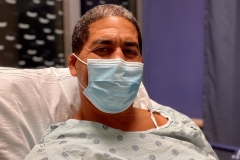
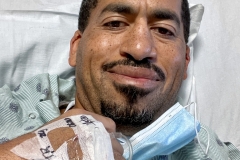
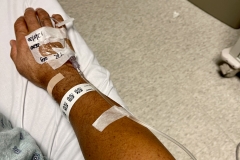
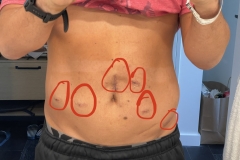
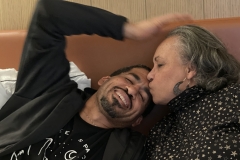
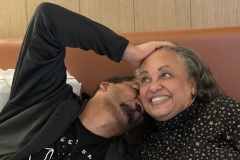













Trackbacks/Pingbacks